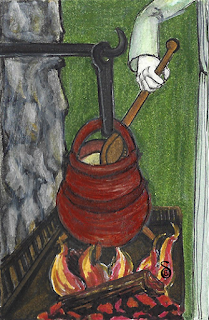The novel Courting Trouble is set in the early days of the Anglo Saxon era. At this time, Christianity was relatively new for the group, and customs were still influenced by their early pagan culture. In this scene, Cynethrith wants to foil what she believes is her stepmother's plan to send the girl to a convent and keep her inheritance. Cynethrith resolves to set out on an adventure, and justifies her decision by quoting an old Anglo Saxon poem.
I knew perfectly well that [my stepmother] was planning to ship me off to a convent as soon as she could without causing a lot of talk. In any event, I certainly wasn’t going to sit around and wait for her to arrange a match for me. As the ancient wisdom of our people advises:Girls, steal secretly to your sweethearts
So no one says
That you were bought with booty.
But for the time being I went along with her pretense.





